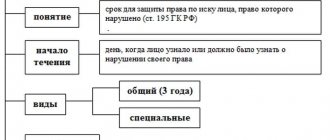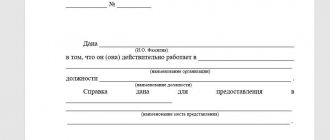Employee notification
Since the bonus is one of the components of the salary, the following question arises: is it possible to suspend work due to non-payment of the bonus?
However, in this case it will not be possible to suspend work on legal grounds. The issue of bonus payment itself can be considered controversial. If an employee is 100% sure that he is entitled to a bonus, that is, he has fulfilled all the conditions for its appointment and the company’s regulatory documents provide for its payment, then in this case it is recommended to contact the authorities that consider labor disputes. The employee should remember that he does not have the right to suspend work due to non-payment of bonuses.
In order to “return” employees, the employer notifies of its intention to repay the debt. At the same time, he only notifies about it, does not list it. After receiving notice from the employer, the employee must return to work. If he does not do this, the employer has the right to regard this as absenteeism.
The Labor Code of the Russian Federation provides citizens with ample opportunities to protect labor rights. In particular, workers are given the right to self-defense of labor rights, which can be expressed by legal suspension of work if wages are not paid for more than 15 days from the date when they are due.
Mechanisms for self-protection of labor rights, including in case of non-payment of wages, continue to be improved. Thus, Federal Law No. 434-FZ dated December 30, 2015 amended Art. 142 of the Labor Code of the Russian Federation, it was supplemented with part 4, which guarantees the employee the preservation of average earnings during the period of suspension of work due to non-payment of wages.
Previously, this issue was considered by the courts based on the recommendations of the Ministry of Labor, which did not contribute to the uniformity of judicial practice. This Federal Law established the position of the Supreme Court of the Russian Federation, based on the clarification that non-payment of wages is an unlawful inaction of the employer and should be considered as an illegal deprivation of the employee’s opportunity to work.
What to do if your salary is reduced at work?
How to correctly formalize a refusal to work in case of delay in salary?
The key to terminating work on this basis is to notify the employer in writing. This may be an official letter left in the employer's office with a note indicating the registration of the incoming document. The law does not establish any time limits for sending notice to the employer. Therefore, the employee, having delivered the notice, has the right to leave the workplace on the same day. Notification of work suspension may be collective.
Important! If an employee leaves the workplace but does not notify the employer in writing of his intention, this will be regarded as absenteeism. And if an employee goes to court with a claim for reinstatement at work, the court clearly recognizes such dismissal as legal.
During the suspension of work, the employee retains his average earnings.
That is, the employer must pay for the entire period of absence of the employee as forced absence.
Compensation for delayed wages
The entire time of suspension of work must be paid by the employer in the amount of average daily earnings for each day of downtime. If the employer refuses to do this, the employee has the right to go to court. However, there are several opinions on this matter. Rostrud, for example, in this matter, takes the employer’s side and says that the employee did not work during this period of time, which means he is not entitled to a salary.
In some cases, it is proposed to consider such a suspension of work as downtime due to the fault of the organization. In this case, payment is provided in the amount of 2/3 of the salary. But in this case, the employee loses part of his salary, which worsens his situation. Therefore, idle conditions cannot be used instead of suspension; these are two completely different concepts.
Judicial authorities usually side with the employee, indicating that in addition to average earnings, the employer is also obliged to pay compensation for the entire delay. This is explained by the fact that the employee’s adoption of such a decision is a forced measure, which is permitted by law to encourage the employer to pay wages on time. This right allows you to eliminate the violation committed by the employer in the issue of payment of delayed wages.
We invite you to familiarize yourself with: Legal status of the personal data operator
There are many authorities where an employee can complain in case of non-receipt of wages. The main ones are the labor inspectorate, the court and the prosecutor's office. Contacting these authorities will help restore justice and punish the unscrupulous employer.

If workers are not paid wages for a long time, they have to go into debt and take out loans in order to simply live on something and go to work. As a result, in addition to the main borrowed funds, you often have to pay interest to banks and microfinance organizations, refuse lucrative offers to purchase something, and save. This is only a small part of the troubles that people experience when they do not receive their salaries on time.
When going to court over unpaid wages, an employee has the right to demand not only the money owed to him for performing work duties, but also compensation for moral damages, as well as lost profits.
The law provides for penalties for employers for non-payment of wages; it will depend on the length of the delay, the amount of debt, as well as the reasons why payment was not received on time. Based on this, the employer may face:
- Financial responsibility. That is, management will be obliged to pay not only the debt for work, but also compensation for employees (the procedure for its calculation is presented in Article 236 of the Labor Code);
- Administrative - in the form of a fine (for repeated violations up to 150,000 rubles);
- Criminal - up to 5 years in prison.
But workers need to take into account the fact that the employer’s liability occurs only if an inspection has been carried out at the enterprise and the guilt of the management has been proven. And to initiate an inspection, a reason is needed - a statement from employees. Therefore, you should not tolerate management’s negligence; you need to contact the competent authorities and protect your rights.
Suspension of work activities
According to statistics, every 5 working citizen has encountered a violation of his labor rights. The most common of them is delay or non-payment of wages. Nobody wants to work “for free,” but few know that there is a law according to which an employee has the right not to attend the workplace if his salary is delayed by more than 15 days (Article 142 of the Labor Code of the Russian Federation).
The delay in wages is not counted from the moment of the last transfer of funds, but from the date that is considered the day of payment of wages under the contract.
In order not to officially attend the workplace during the period of delay in payment, the employee must notify management about this. This is best done in writing in the form of a notice or notice. In this case, you need to make sure that the letter reaches your superiors. To do this, it should be submitted through the reception secretary with the assignment of an incoming number, or by mail with acknowledgment of delivery.
If notification of suspension of work due to non-payment of wages is not received, management may regard the employee’s absence from work as absenteeism and reprimand him or even fire him.
We suggest you familiarize yourself with: Personnel work with branches
It should be noted that in some situations suspension of work is not possible. Namely:
- If wages are delayed during an emergency or declared martial law;
- If the employee works in the civil service or in a hazardous industry;
- If the worker’s activities are related to medicine or housing and communal services.
In these cases, the employee is obliged to attend his workplace even despite the delay in payment.
We draw up a letter
There is no specific established form for writing a notice of suspension of work; it is written according to the general rules of business correspondence, namely:
- When writing, it is prohibited to use obscene expressions;
- The notification must exclude semantic, spelling and other errors;
- The essence of the notification should be stated briefly and to the point, without the use of complex and emotionally charged speech patterns.
To simplify the process of writing an application, you can use a ready-made template.
Sample
The notice of suspension of work consists of several parts:
- Document header.
- Name.
- Main part.
- Signature and date.
In the header of the document you should indicate the name of the organization, full name of the head, full name and position of the applicant.
As for the name of the document, it can be called: statement, notification or notice.
In the main part, you need to write down the reason for refusing to go to work (due to delays in payment), the deadlines within which wages must be paid under the contract, and the deadlines for late payments. When writing the main part, you can use links to articles of the law, namely Part 2 of Article 142 of the Labor Code of the Russian Federation.
The notice should state that the return to work duties will occur only after full payment of the salary debt.
At the end of the notification the date of writing and the signature of the applicant are indicated.
How to properly start work after paying delayed wages?
This is an important point, since the wrong way out of forced absence can lead to other troubles for the employee. You should go to work the next day after receiving notification from your employer that you are ready to fully repay your salary debt.
The notice can be delivered to the employee either by post with acknowledgment of delivery, or by hand, with the employee’s note indicating receipt of the notice. The date of return to work will be the day following the date of receipt of the notice.
Important! In the event of a delay in wages, the employer is obliged to pay it to the employee, taking into account interest (monetary compensation) in the amount of 1/150 of the current key rate of the Central Bank of the Russian Federation for each day of delay until the day of actual payment.
Such compensation is paid by the employer in an indisputable manner and does not require going to court (Article 236 of the Labor Code of the Russian Federation).
That's all. If the article was useful, I invite you to discuss it.
Algorithm for further actions
After writing and delivering the notice, the employee may not attend the workplace. It is in the employer’s interests to repay the debt as quickly as possible. Therefore, after the employer receives the application and finds funds to pay off the wage debt, he is obliged to notify the employee in writing.
The letter must indicate that the employer is ready to pay the debt on the day the employee returns to work. After receiving the letter, the employee must go to his workplace and continue his work.
When is absence from work legal?
Article 142 of the Labor Code of the Russian Federation allows an employee, in the event of a delay in wages for a period of more than 15 calendar days, to suspend work, having previously notified the employer in writing. It does not matter whether the employer is to blame for the delay in wages or not. The 15-day period of delay begins to run from the day following the day of payment of wages (part of them), established by the internal labor regulations (Article 14 of the Labor Code of the Russian Federation).
Thus, from the 16th day of salary delay, the employee has the legal right not to go to work. The absence of the employee from the workplace in this case will be legal without the right to apply disciplinary measures against him. You can stay at home indefinitely until the employer is ready to pay the salary debt in full.
Average earnings
The calculation of the average earnings due to an employee who has suspended his work activity due to non-payment of wages is made on the basis of Art. 139 of the Labor Code of the Russian Federation and the Regulations on the specifics of the procedure for calculating the average salary (approved by Decree of the Government of the Russian Federation of December 24, 2007 N 922).
The calculation takes into account all payments provided for by the organization’s remuneration system. As a general rule, to determine the average salary, a single procedure for calculating it is used, which involves taking into account the actually accrued salary for the 12 calendar months preceding the moment of payment (saving) of the average salary.
Furthermore, in accordance with Art. 236 of the Labor Code of the Russian Federation, the employee has the right to demand payment of interest in an amount not less than 1/300 of the refinancing rate of the Central Bank of the Russian Federation in force at that time on amounts unpaid on time for each day of delay, starting from the next day after the established payment deadline until the day of actual settlement, inclusive.
The entire period of work suspension must be paid based on the employee’s average earnings. To do this, the average daily earnings are multiplied by all days of suspension. To determine the average daily earnings, payments for the entire pay period must be divided by the number of days that the employee worked in the pay period.
All days when the employee retained his average salary, for example, vacation pay, business trips, etc., are excluded from the billing period. Payments for the billing period include only those that are directly related to the wage system. For excluded periods of time, payments must also be excluded.
Do I need to pay an employee for time absent from work due to delayed wages?
In the last months of last year, the growth of overdue wages intensified. However, no one repealed the law. In accordance with Article 142 of the Labor Code of the Russian Federation, if payment of wages is delayed for more than 15 days, employees have the right to suspend work, and the employer is obliged to pay them for this time. In what size? This is exactly the topic we will talk about today.
Is payment in question? Based on generally accepted principles and norms of international law and in accordance with the Constitution of the Russian Federation, an employee has the right to timely and full payment of wages for his work. In accordance with Article 136 of the Labor Code of the Russian Federation, payments must be made at least every half month on the days established by the internal labor regulations, collective agreement, or employment contract. If the employer violates the established deadlines for paying wages, the Labor Code of the Russian Federation (Article 142) gives the employee the right to suspend work (except for the cases listed in part two of Article 142 of the Labor Code of the Russian Federation) for the entire period until the delayed amount is paid. It is important to remember that an employee cannot be subject to disciplinary action for refusing to work if:
- the delay in payment of wages on the day of suspension of work was more than 15 days;
- Before suspending work, the employee notified the employer in writing.
In fact, it turns out that suspension of work (on legal grounds!) due to non-payment of wages is an individual form of employee self-defense, which is stated in Article 379 of the Labor Code of the Russian Federation.
This means that during the period of suspension of work (regardless of whether the employee was at the workplace or not*), he must retain all the rights provided for by labor legislation and other acts containing labor law norms (Article 379 of the Labor Code of the Russian Federation), as well as guarantees of the exercise of the right to self-defense. For example, maintaining a job (position), maintaining wages. The employer has no right to prevent employees from exercising self-defense of their labor rights. Although, to be completely objective, it should be said that the issue of payment for suspension of work within the framework of self-defense is not directly regulated by law. Therefore, different opinions are often expressed on it. Some believe that this time is not subject to payment at all, others that it is subject to payment, but according to the rules of payment for downtime, and others - in the amount of lost earnings. Let's figure this out.
From the Labor Code of the Russian Federation...Suspension of work is not allowed:
Part two of Article 142 of the Labor Code of the Russian Federation |
Payable
So, since no one doubts that refusal to work in case of delay in payment of wages is a form of self-defense of the employee, then in order to exercise this right the employee must be provided with appropriate guarantees. Including wages. Otherwise, can refusal to work be considered self-defense? After all, in this case, the employee loses not only in earnings, but also in the payment of vacation pay and other amounts calculated from average earnings. For example, consider the following situation.
Example
An employee notified the employer in writing of the suspension of work due to a delay in paying him wages (the delay was more than 15 days). The employer informed that no payment would be made to him for the period of suspension. As a result, the employee was forced to continue working, since wages were the only source of income for him and his family.The above example shows that in the absence of payment, an employee most often continues to work for fear of losing it. He cannot use self-defense as a way to assert his right to gainful employment. Thus, the norms of Articles 21 and 379 of the Labor Code of the Russian Federation are violated. And Article 142 acquires a declarative character.
Thus, despite the fact that the code does not clearly state that the time of suspension of work in the event of a delay in wages must be paid, recognition of such suspension as a form of self-defense of the employee implies a guarantee of payment for this period.
Another argument in favor of payment is that, in accordance with the Labor Code of the Russian Federation (Article 155), payment of the standardized part of wages is not made only if job duties are not fulfilled due to the fault of the employee. Since there is no fault of the employee in the situation under consideration, the period of refusal to work is subject to payment.
| Forced labor is prohibited After amendments were made to the Labor Code (Federal Law of June 30, 2006 No. 90-FZ), the concept of “forced labor” was clarified. Now forced labor refers to work that a worker is forced to perform under the threat of any punishment, while by law he has the right to refuse to perform it. In particular, in case of violation of salary payment deadlines. At the same time, we draw your attention to the fact that in practice it is virtually impossible to prove whether a threat took place or not (assuming that it was expressed orally). If an employee goes to court, it is possible that the decision will be in his favor. |
How to pay?
We propose to consider this issue from the perspective of the employer's responsibility. It is no coincidence that an employee’s right to suspend work in the event of a delay in payment of wages is considered in the context of the article (Article 142 of the Labor Code of the Russian Federation), which defines the employer’s liability for failure to pay wages and other amounts due to the employee on time.
Let’s say an employee’s wages are not paid on time (the delay is more than 15 days), but the employee continues to work under the threat of punishment (for example, dismissal or other disciplinary action). Please note that in this case we will be talking about forced labor (Article 4 of the Labor Code of the Russian Federation). Since forced labor, according to the Constitution of the Russian Federation (Article 37), is prohibited, in this situation the employer, in fact, violates the employee’s constitutional right to free labor. This means that the employee has every right to leave his job. Are there any guarantees in this regard in the law? We answer, they exist. In all cases of illegal deprivation of the opportunity to work, the employer bears financial liability to the employee in the form of compensation for the earnings he did not receive (Article 234 of the Labor Code of the Russian Federation). For non-payment of wages for more than two months, liability is established under Article 145.1 of the Criminal Code of the Russian Federation.
There is an opinion that, by virtue of the same article 234 of the Labor Code of the Russian Federation, the employer must bear full financial responsibility if the delay in payment of wages is caused by his guilty illegal actions (inaction). If the delay in payment occurred for reasons beyond the control of the employer, then the period of suspension of work must be paid as idle time (at least two-thirds of the tariff rate, salary) (Article 157 of the Labor Code of the Russian Federation). Let's see if this is true. Indeed, at first glance it may seem that the suspension of work in case of delayed wages and downtime have much in common: in both cases there is a temporary suspension of work for economic reasons. Delays in wages and downtime can be caused by both culpable actions (inaction) of the employer and reasons beyond his control. And therefore, payment should be made by analogy.
At the same time, refusal to work in self-defense is not downtime (Article 722 of the Labor Code of the Russian Federation). This means that the application of the rules of payment for downtime to the suspension of work as a form of self-defense is not permissible. In addition, one cannot fail to take into account that the right to suspend work in case of delayed wages is granted regardless of whether the employer is at fault in the actions. In the work time sheet, this time, unlike downtime, is indicated by the letter code “NZ”, regardless of whose fault the suspension occurred. Consequently, the guarantee of payment should also not be made dependent on the employer’s fault. In this case, the most correct option would be to reimburse lost earnings in full. Downtime is a temporary suspension of work for reasons of an economic, technological, technical or organizational nature.
Thus, in order to avoid lawsuits, employers should keep in mind that during the time during which the employee suspended work in self-defense in case of violation of the payment deadlines, the employee should not lose any pay. By the time the actions for self-defense of rights are completed, the employee must receive the delayed salary due to him, taking into account interest (monetary compensation) (Article 236 of the Labor Code of the Russian Federation) plus wages for the period of suspension of work.
| From the Labor Code of the Russian Federation If the employer violates the established deadline for the payment of wages, vacation pay, dismissal payments and other payments due to the employee, the employer is obliged to pay them with interest (monetary compensation) in the amount of not less than one three hundredth of the current Central Bank refinancing rate Bank of the Russian Federation* from unpaid amounts on time for each day of delay starting from the next day after the established payment deadline until the day of actual settlement inclusive. The amount of monetary compensation paid to an employee may be increased by a collective agreement or employment contract. The obligation to pay the specified monetary compensation arises regardless of the employer’s fault. Article 236 * From December 1, 2008, the refinancing rate is 13% per annum (Instruction of the Bank of Russia dated November 28, 2008 No. 2135-U). |
* During the period of suspension of work, the employee has the right to be absent from the workplace during his working hours (part three of Article 142 of the Labor Code of the Russian Federation).









